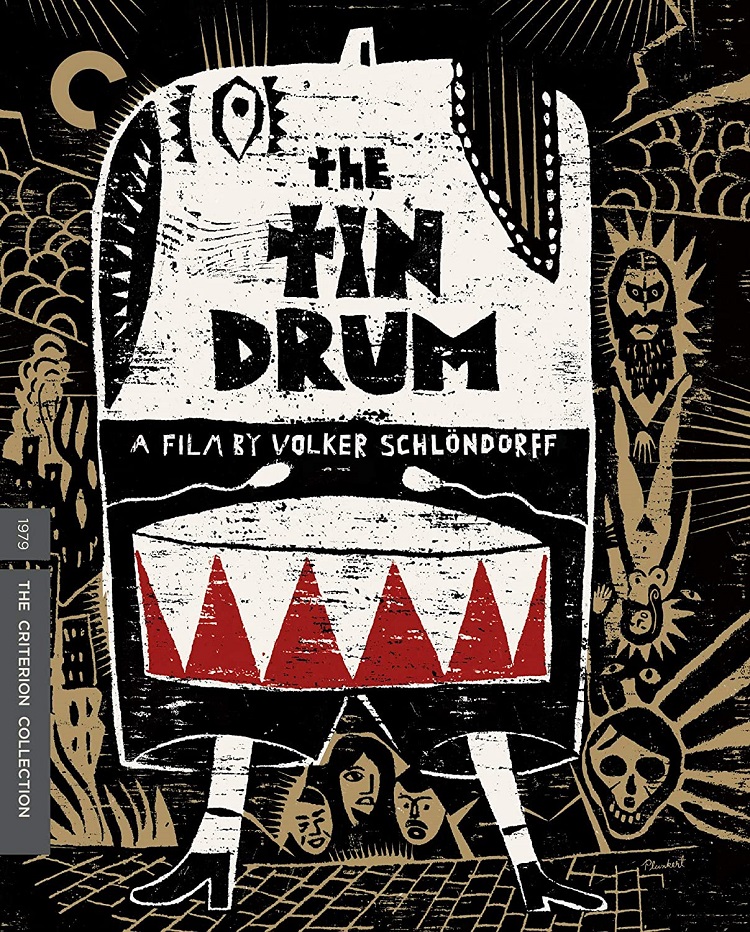
A dazzlingly dark and often very funny fable, The Tin Drum is a terrific motion picture. The 1979 film by German director Volker Schlöndorff is an adaptation of the Günter Grass novel of the same name. The movie generated considerable controversy at the time of its release, but it won the Palme d’Or at the 1979 Cannes Film Festival and also scooped the Oscar for Best Foreign Language Film that year.
Schlöndorff’s picture is presented in its director’s cut format thanks to the good people at Criterion Collection. This version of the film is 163 minutes long, about 20 minutes longer than the original theatrical release. Schlöndorff sifted through roughly 180,000 feet of negative and, in 2009, pieced together the edition of the motion picture seen on this Blu-ray release.
The Tin Drum tells the story of Oskar Matzerath (David Bennent). He is a very special individual in that he refuses to grow up past his third birthday. Borne from a “trinity” that includes his mother Agnes (Angela Winkler), her cousin Jan (Daniel Olbrychski) and a man named Alfred (Mario Adorf), Oskar’s already seen enough of life and proceeds to toss himself down the cellar stairs. This incident presumably stunts his growth and he remains a “gnome” throughout the much of his life.
Oskar’s refusal to face reality, so to speak, means that the rise of the Nazis and the domestic troubles he endures are seen through the eyes of a child. When his mother is impregnated again and attempts to induce an abortion by gorging on fish, Oskar is seemingly oblivious to this fact. And when he first encounters love in the form of Maria (Katharina Thalbach), he is clueless as to how to handle his sexual energy and his expected jealousy.
The Tin Drum veers through history through the eyes of Oskar. It includes the rise of Nazism, detailing this in a number of humorous and dark scenes. It also illustrates the costs of Oskar’s determined ignorance, namely in the way he “drums” his mother to her grave and costs the life of a Polish caretaker.
Oskar seems to abide by the words of a character early in the picture (“beauty indeed is youth”) and aims to duck the cares of the world by remaining fixed to his titular tin drum. He acts out with the witlessness of a child, but his eyes betray more familiarity than he lets on. When he pitilessly assaults Maria in covetous fits, it’s clear that Oskar knows what he’s doing. And when he observes the ferocity of war, he knows what he’s seeing.
The Tin Drum is based on the first book in Grass’ The Danzig Trilogy, a series of novels based around the formerly free city of Danzig. Schlöndorff’s film adaptation of The Tin Drum doesn’t cover the entirety of the novel, but it does introduce us to a world once brimming with liberty in the fabled city. Danzig changes and Oskar’s refusal to evolve is juxtaposed against the rise of Nazism and the corrosion of free, refined living.
This apposition is further examined through the relationship between Oskar’s two latent fathers, the Pole Jan and the would-be Nazi Alfred. Both men exist in prickly flux with one another, sometimes friends but seldom enemies. They have an understanding, it could be said, and Oskar’s relationship must be influenced by the way his mother is allocated between the two men.
Bennent, who plays Oskar, was 11 years old at the time he was in The Tin Drum. Putting a 11-year-old in scenes of a sexual nature certainly ruffled more than a few feathers and the picture wound up being banned as child pornography by the Ontario Censor Board and in Oklahoma City under obscenity laws. Those rulings have since been overturned and a documentary feature was made about the controversy for release on the 2004 Criterion release.
The emergence of this director’s cut seems to suggest that the hullabaloo is in the past and The Tin Drum now deserves a look without such wayward accessories. Indeed, it would seem that the movie’s sexuality is educational in its proper context as a way of suggesting just how one’s self-inflicted arrested development can both hearten and poison one’s sexual development.
The Tin Drum is a beautifully-shot, well-constructed motion picture. There are many highlights, from the use of hand-cranked cameras in the opening shots to the caustic and funny Nazi rally sequence in which Oskar’s drum is put to astounding use, but Schlöndorff’s film is more than the sum of its parts. A complete journey, ominous and innocent at once, this is one of the best pictures to ever come out of Germany.
As is almost always the case, the Criterion Collection Blu-ray release is a knockout. The high definition transfer is gorgeous; colours are rich and visuals are crystal-clear in all the right places. The different camera effects are really driven home, from the sequence involving Oskar’s great fall down the stairs to the lovely sweeping photography of the Nazi rally, and the “new” scenes for the director’s cut are seamlessly integrated. Audio is presented in lossless DTS-HD Master Audio 5.1 German with English subtitles.
The bonus features include a brand new interview with the director about this edition and an interview with film scholar Timothy Corrigan. An original audio recording of Grass reading a scene from his book while the same scene from the film plays out is a nice touch, while a few television interview excerpts prove informative. There’s also a booklet featuring an essay by Geoffrey Macnab.